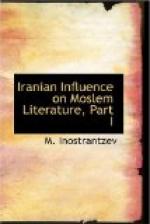[Footnote 1: I have constantly referred to Haarbrucker’s German translation and to the German passages cited by Gottiel in the Drisseler Volume which was very kindly presented to me by our Prof. A.V.W. Jackson. Gottiel has omitted the sections regarding the Kayumarthiya.]
THE ZARADUSHTIYA.
These are the followers of Zaradusht, son of Budashab who appeared in the time of Bishtasb, son of Lohrasb, the king. His father came from Azarbayjan and his mother from Ray and her name was Doghd. They assert that they had prophets and kings and that they had Kayumarth who was the first king on the earth and that his residence was at Istakhar, that after him came Haushanj, son of Farawal, who descended on India. After him came his son Jam; the king. Then followed prophets and kings among whom was Minochehr. He proceeded to Babel and settled there, and it is related that Musa, (may peace be on him!) appeared in his time. Things continued like this till the sovereignty came to Bishtasb, son of Lohrasb. In his time appeared Zaradusht al Hakim or the Wise....
[Sidenote: Miracles of Zoroaster.]
[Sidenote: Essence of his teachings.]
[Sidenote: His Cosmogony.]
Then the child [Zaradusht] laughed a great laugh which was noticed by all those present, and people contrived so as to put Zaradusht in the way of cattle and the way of horses and in the way of wolves. But each of them stood up to protect him from its own kind. After he had attained to an age of thirty God sent him as his prophet and apostle to his creation, and he turned himself with his calling to king Bishtasb and the latter accepted his creed. His creed consisted in the reverence of God and the non-reverence of Satan, in the obedience to good and in the prohibition of the evil, and in abstaining from unclean things. He said that light and darkness were two original principles which opposed each other antagonistically, and so were Yazdan and Ahriman and that both were the beginning of the created things in the world. That the composition of it was the product of the co-mingling and that the variety of forms were given rise to by means of the various unions, but that God was the creator of light and darkness and of both the prime origins. He was one without a companion, without an opponent, and without anyone who was his like, and that it was not possible to trace to him the existence of darkness in the way in which the Zarwanites trace it, but that good and evil, pure and impure, holy and unholy, were brought forth only by the co-mingling of light and darkness, and had not the two fore-gathered the world would not have come into existence. They were pitched each against the other and they fight each other till light shall overcome darkness, and good evil. And then the good will be liberated and come to its own, and the evil will be hurled down to its own world and that will be the cause of the




